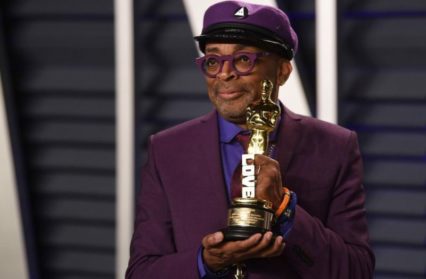Thomas Tyrrell looks at the gaping chasm between two of this year’s Oscars most controversial movies, both of which tackle the racial issues embedded in American society, but in very different ways.
What no-one tells you about Green Book is that it’s a Christmas movie. In 1960s New York, Italian-American roughneck Tony Lip is hired by the black classical musician Don Shirley as driver and facilitator for a concert tour down into the heart of the Jim Crow era South, culminating in a Christmas Eve performance in Birmingham, Alabama. It’s a perilous time to be black in the South, but Shirley’s high-life contacts and Tony’s streetwise diplomacy ease them out of a number of sticky situations, and the film is built on their increasing respect and odd-couple friendship, aided by charismatic performances by Viggo Mortensen and Mahershala Ali.
 The ending sees them driving home in a violent snowstorm, Tony Lip all but falling asleep at the wheel as he battles to keep awake, to get back to New York in time to have Christmas dinner with his family. He wakes to find himself in the back of the Cadillac, with Don Shirley at the wheel. Their employer-employee relationship has finally dissolved into simple friendship. Shirley drops Tony off at his family’s door, where the returning father receives a rapturous welcome. Shirley, meanwhile, returns to his splendid but solitary flat above the Carnegie Hall. When, with the inevitability of all Hollywood happy endings, he turns up outside Tony’s apartment, his former driver throws an arm around his shoulders and introduces him to the family. At the start of the movie, Tony’s relatives were so racist they wouldn’t leave Tony’s wife alone with two black workmen; now they scramble to find Don Shirley a space at the table.
The ending sees them driving home in a violent snowstorm, Tony Lip all but falling asleep at the wheel as he battles to keep awake, to get back to New York in time to have Christmas dinner with his family. He wakes to find himself in the back of the Cadillac, with Don Shirley at the wheel. Their employer-employee relationship has finally dissolved into simple friendship. Shirley drops Tony off at his family’s door, where the returning father receives a rapturous welcome. Shirley, meanwhile, returns to his splendid but solitary flat above the Carnegie Hall. When, with the inevitability of all Hollywood happy endings, he turns up outside Tony’s apartment, his former driver throws an arm around his shoulders and introduces him to the family. At the start of the movie, Tony’s relatives were so racist they wouldn’t leave Tony’s wife alone with two black workmen; now they scramble to find Don Shirley a space at the table.
It’s pure schmaltz. But it’s superior schmaltz, the kind you would welcome the chance to channel-hop over to on Christmas morning, after the credits have rolled on It’s a Wonderful Life. It’s a movie about the importance of family, about the redemption of that racist uncle you know has is good at heart. It’s classical Hollywood Chrismas fare of a kind now so endangered that it had to premiere at Thanksgiving in the USA and after New Year in the UK in order to escape the slew of gross-out comedies and kiddy CGI movies cluttering the Yuletide schedule.
 What no-one tells you about BlacKkKlansman is that it’s a horror movie. After the main plot has been resolved by the Ku Klux Klan blowing themselves up in a bungled bombing, Ron Stallworth and Patrice Dumas are sitting in a safehouse discussing their relationship. White supremacy has been defeated, both in the Colorado Springs police force and the town as a whole, and the final threads of the romantic subplot seem ready to be wrapped up in a tidy knot. Suddenly, there’s a knock at the door. The student radical and the undercover cop pull guns. They glide down the apartment corridor like dreamers in a nightmare. Away on a hillside beyond the window, a fiery cross is blazing. Klansmen stand around in hooded robes, throwing flaming torches on the pyre. And we cut suddenly to the infamous torchlit procession in Charlottesville in 2017, to the racist chants, to the riots, to the murder-by-automobile of Heather Heyer. Film gives way to documentary, editing to montage. It’s an appalling combination of Brechtian alienation, stripping away the comforts of fiction to lay bare the cruelties of real life, and the classic Halloween horror movie reveal. The monster isn’t dead. It will never be dead. It will always return to plague generation after generation.
What no-one tells you about BlacKkKlansman is that it’s a horror movie. After the main plot has been resolved by the Ku Klux Klan blowing themselves up in a bungled bombing, Ron Stallworth and Patrice Dumas are sitting in a safehouse discussing their relationship. White supremacy has been defeated, both in the Colorado Springs police force and the town as a whole, and the final threads of the romantic subplot seem ready to be wrapped up in a tidy knot. Suddenly, there’s a knock at the door. The student radical and the undercover cop pull guns. They glide down the apartment corridor like dreamers in a nightmare. Away on a hillside beyond the window, a fiery cross is blazing. Klansmen stand around in hooded robes, throwing flaming torches on the pyre. And we cut suddenly to the infamous torchlit procession in Charlottesville in 2017, to the racist chants, to the riots, to the murder-by-automobile of Heather Heyer. Film gives way to documentary, editing to montage. It’s an appalling combination of Brechtian alienation, stripping away the comforts of fiction to lay bare the cruelties of real life, and the classic Halloween horror movie reveal. The monster isn’t dead. It will never be dead. It will always return to plague generation after generation.
Green Book is a good movie, but it isn’t what you’d call a challenging one. Its firm anti-racist message is warm-hearted and generous, but won’t do much to change minds. Even Black Panther, with its idiotic #KillmongerWasRight hashtag, provoked more interesting discussions. BlacKkKlansman is a film whose outrage never tips over into a rant. It stays nuanced and collected all through, leavening its anger with humour and entertainment. It gets the audience just where they want them… and then it rips the rug out from under their feet. In my judgement, it’s a far superior piece of film-making, but your patience for either depends on whether your view of the world best corresponds to a Christmas movie or a horror film. However much Hollywood might pride itself on its wokeness, the evidence of Green Book’s surprise Best Picture win shows that it will happily settle for schmaltz and sweetness, whenever the chance allows.












